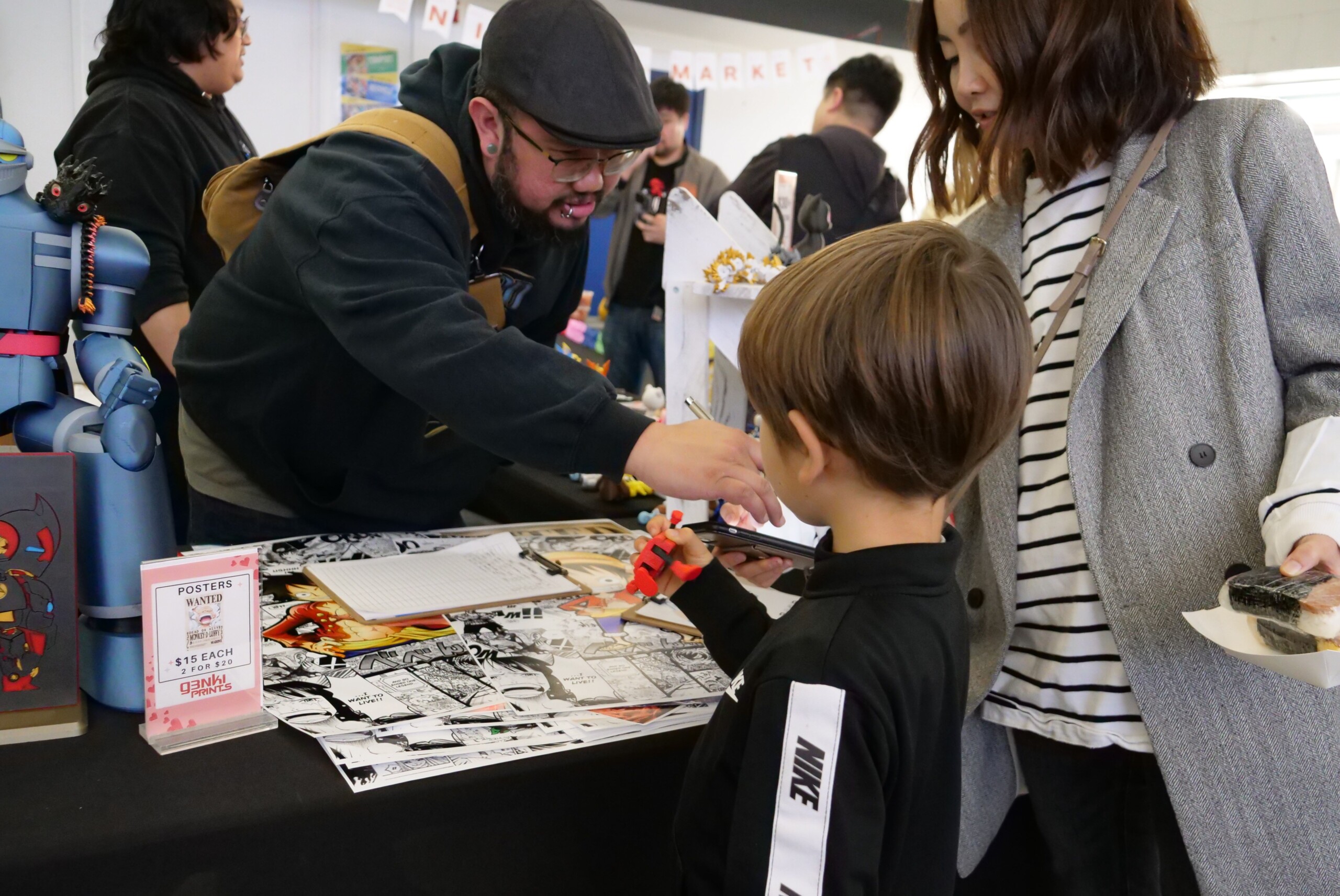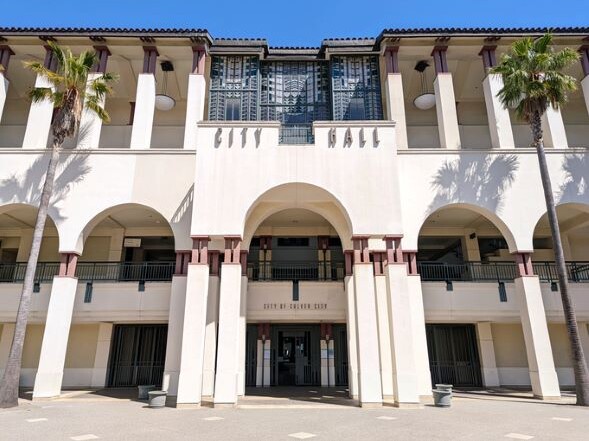There are moments in time when you take something in, and it really makes you think.
Culver City High School (CCHS) hosted an Asian American and Pacific Islander Night Market on Friday, February 9. Organized and championed by Culver City School Board member Stephanie Loredo, the event featured booths from local businesses and other services owned by the AAPI members of the community.
As a Japanese-American myself, it was nice to see people out and recognizing the diversity of Asian American culture. A Japanese Taiko band, a Filipino martial arts group, and a Chinese-inspired Dragon parade were the main events of the evening, demonstrating the great depth of diversity within the Asian American community.
Standing amidst the rows of booths selling merchandise and food, the bustling crowds enjoying great food and an interesting variety of merchandise from local vendors from various Asian communities, it got me thinking about representation as a whole.
There is a great deal of discourse around Asian Americans as people of color, and yet many people are still unaware of the very complex and sometimes hostile relationships between many of the Asian ethnic groups, and their desire to be distinguished from one another.
That was made painfully clear at Congressional hearings earlier this month on high-tech issues. U.S. Senator Tom Cotton, R-AR went down a line of questioning attempting to connect TikTok CEO Shou Chrew to the Chinese Communist Party.
There’s just one problem with that: Chew is from Singapore, not China. Chew had to explain repeatedly to Cotton that Singapore is not a part of China.
If even at the highest level in government you see ignorance and racism that you would expect in a Saturday Night Live opening, how can we expect their constituents to tell the difference between a Laotian and a Malaysian?
Of course, I don’t expect much from Arkansas when it comes to awareness and sensitivity of social issues, but it highlights the greater issue of a basic lack of understanding of Asian cultures, or Asian countries for that matter. The only real solution, however many generations it may take, is education.
It is events like the Night Market that Loredo and CCHS hosted that will help further the mission of helping this country understand their peers with Asian ancestry, and we must continue to hold them around the country to further educate some and help others feel represented. It helps teach people that Spam Musubis is Hawaiian, Korean food is more than just Barbeque, and not every Asian martial art is Japanese or Chinese.
But the issues that plague the Asian American community go beyond a lack of understanding. I understand that it’s not reasonable to expect every man, woman, and child to be able to tell me the difference between shochu and soju, but what I do expect is for the people in the community to be aware that “Asian” isn’t the way most of us want to be thought of as.
“Aggregation is a big problem because Asian Americans represent so many diverse groups,” Dr. Gilbert Gee, PhD said in a UCLA Health article on mental health in Asian Americans. “You have people from Pakistan who are assumed to be equivalent to people from Korea or from Thailand or the Philippines, and all these subgroups are very different.”
Why is making these distinctions so important? Many Asian countries have clashed in the past and committed terrible atrocities towards one another, so I can understand why a Chinese person wouldn’t want to be mistaken for a Japanese person or an Indian person wouldn’t want to be mistaken for a Pakistani person, and vice versa.
The other reason that distinguishing between these different Asian cultures is important is to dispel this idea of Asians as a “model minority.” There is certainly a reason that this stereotype became prevalent: Asian men in the United States had a median income almost 70 percent higher than Black men in 2022 and is also higher than the median income for White men, according to data from the U.S. Department of Labor.
It is important to note that this discrepancy isn’t just simply due to the differences in perceptions on education; many minority groups’ troubles with the education system are a whole different story. But there is more diversity not just among Asian cultures, but from within these individual groups.
It’s easy to just group everyone under one umbrella and call it a day, but members of less recognizable Asian ethnic groups like Cambodians — where the highest concentration of them outside of their native country is found in Long Beach — deserve to be represented all the same.
The biggest problem is the perceptions that it can cause both from outside and from within. Asian people face stereotypes that many outsiders see as positive but can turn into one of the most detrimental things to a person’s development, and that is no more apparent than in one of the most prevalent Asian stereotypes that perpetuate even in their own communities.
Trust me when I say this: not every person of Asian descent is good at math or with numbers as a whole, and they don’t want to constantly be reminded that they aren’t able to do what they are supposedly supposed to be born to do from their peers. On top of that, many parents still deeply rooted in Asian cultures can be very tough on kids struggling with grades, reminding them once again that they aren’t as good as they are “supposed to be.”
Another group that hosted a booth at the Night Market illuminated another problem in the community: issues with voter information. The Center for Asian Americans United for Self Empowerment (CAUSE) LA teamed up with UCLA and Loyola Marymount to get the word out about a survey regarding the accessibility of voter information for the Asian American community, hoping to understand the issues with voter engagement in these communities.
CAUSE LA Executive Director Nancy Yap said that the AAPI has historically been ignored come election season, and she says the group is looking for people to tell them exactly how much information they are getting from candidates so far this election season, and whether or not accessibility issues like language barriers have prevented people from comprehending the information they are receiving.
“Even when they do receive outreach, it can be very lacking,” she told Westside Voice.
When it comes to election season in California, it seems that so much emphasis is put on reaching the African American and Latino communities that many Asian groups get lost in the clutter.
I am not trying to deny that these groups do not face their own challenges when trying to claim representation in elections, but the diverse number of Asian ethnic backgrounds and languages makes it more difficult for voters to get information in a way they can understand.
Data from Statista.com shows that five of the top seven languages other than English spoken at homes in the U.S. in 2022 were languages from Asian ethnic groups — Chinese, Tagalog, Vietnamese, Arabic, and Korean. However, while it is easier to focus on and reach the over 42 million Spanish speakers in the country, reaching out to voters in Asian ethnic languages when the top four combine for around 9.34 million total speakers among them as of 2022 is an extra effort that is pushed off the priority list on many campaign trails.
I am sure you are asking yourselves “What is the point of bringing this all up?” I think that it is important for people in the modern civil rights movements and campaigns to focus on and understand all minorities. The work might be harder, and the people who can do it might be even harder to come by. But the people in these communities deserve to feel recognized just as everyone else does.
The young Filipino-Japanese Girl Scout who set up a booth at the market to sell cookies for her troop (I bought 10 boxes…they were gone in a week). The Japanese Immersion program students at El Marino who sold bake sale goods and the lemonade that made sure I didn’t pass out from dehydration to raise money for the recent Noto Earthquake in Japan. The kids who took the time out of their weekend nights to show off their culture and perform in front of peers and family.
They all deserve to be represented for who they are and all the nuances of the culture that got them there, because feeling like you’ve been seen, feeling like you matter to others, well…it matters.
Photo by the author.
Stay informed. Sign up for The Westside Voice Newsletter
By clicking submit, you agree to share your email address with Westside Voice. We do not sell or share your information with anyone.








